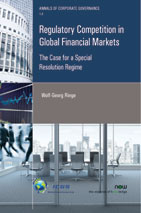Regulatory Competition in Global Financial Markets — The Case for a Special Resolution Regime
Wolf-Georg Ringe, Copenhagen Business School, Denmark and University of Oxford, UK, georg.ringe@law.ox.ac.ukAbstract
Regulatory arbitrage in financial markets refers to a number of strategies that market participants use to avoid the reach of regulation, in particular by virtue of moving trading abroad or relocating activities or operations of financial institutions to other jurisdictions. Where this happens, such arbitrage can trigger regulatory competition between jurisdictions that may respond to the relocation of financial services (or threats to relocate) by moderating their regulatory standards.
This study develops a framework for the assessment of both phenomena in the context of financial regulation and the evaluation of their merits. I argue that regulatory competition has many advantages over alternative global approaches, notably international harmonization of regulation, by offering a dynamic process for the discovery of efficient regulatory standards. However, the risk is that countries lower their standards solely to attract business and thereby impose externalities on the worldwide financial market by undermining financial stability as a global public good.
Policymakers worldwide are experimenting with remedies to respond to the phenomenon. I introduce the importance of an effective special resolution regime for financial institutions to the discussion. I argue that, within limits, a credible, worldwide resolution scheme can effectively contribute to reducing the dilemma. Its main benefit would be to tackle the problem of financial stability caused by systemically important financial institutions' excessive risk-taking. If such risk-taking would be judged by market discipline instead of posing a risk to global financial stability, the main downside of regulatory competition could be restrained. Within the boundaries of such a system, competition could then operate and contribute to a market-led design of financial regulation.
Regulatory Competition in Global Financial Markets — The Case for a Special Resolution Regime
Regulatory Competition in Global Financial Markets: The Case for a Special Resolution Regime evaluates the power of market pressure on the way financial regulation is made. It argues that the phenomena of arbitrage and competition in financial rulemaking are potentially more problematic than elsewhere. This is linked to the ease of arbitrage on the one hand, and to the risks of deregulation for global financial stability of the other. This monograph demonstrates that regulatory competition in financial markets is a reality and evaluates its merits. Regulatory competition in financial markets as a response to market behavior has many positive effects for the lawmaking process, but may at the same time pose a risk for and undermine global financial stability as a public good. The resulting dynamics may require regulatory intervention: the traditional response has been to promote international harmonization of legal rules with extraterritorial reach as a comparable unilateral response. In contrast to these traditional concepts, the author introduces the benefi ts that a special resolution regime for financial institutions can bring to the debate arguing that resolution regimes can help introduce market discipline and that threats to market stability can be eliminated where an effective and credible global framework is in place.
Section 2 gives an introduction to the notions of regulatory arbitrage and regulatory competition, and provides an analytical framework to analyze the subject matter of this paper. Section 3 takes the debate into the specific field of financial markets regulation and identifies the problems that it creates in this context. This allows Section 4 to discuss the various regulatory answers that regulators traditionally subscribe to. Section 5 then introduces the benefits that a resolution regime for financial institutions can produce if it is designed in the right way. Section 6 concludes.
